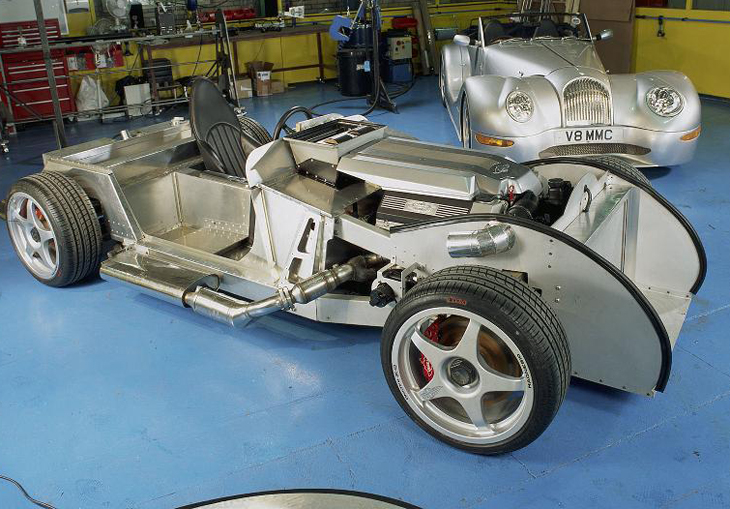
MORGAN MOTOR COMPANY AND BRITISH TECHNOLOGY PARTNERS TO BUILD A HIGH-PERFORMANCE ELECTRIC SPORTSCAR CONCEPT
Zytek is exhibiting at the Low Carbon Vehicle event (Rockingham), September 7 & 8 2011
Unusual configuration with Zytek drive through a manual gearbox will increase performance, range and driver involvement
A new, high-performance electric sportscar prototype is being developed by the Morgan Motor Company and a consortium of British technology specialists. The Morgan +E programme will deliver two engineering concept vehicles early in 2012. Both will be based on a development of the proven Aero Supersport’s aluminium chassis with the 4.8 litre BMW V8 replaced by a new derivative of Zytek’s high power-density electric powertrain driving through a conventional manual gearbox.
The collaborative research and development project is being part-funded by a £100,000 grant from the Niche Vehicle Network CR&D Programme, which is managed by CENEX to provide support and grant funding to groups of companies active in the niche vehicle sector. It promotes the development and application of new technology to take advantage of the increasing market opportunities for lower carbon vehicles.
“This is an exciting investigation into the potential for a zero-emissions Morgan with near supercar performance,” says Morgan’s Operations Director, Steve Morris. “By working closely with Zytek and Radshape, who already have considerable expertise in this field, we aim to make this a realistic concept that could lead to further developments if demand and other factors prove favourable.”
Zytek’s first experience with a high-performance electric sportscar was back in 1997 when it converted a Lotus Elise to electric drive. The Award-winning design led to engineering programmes with Chrysler and General Motors, closely followed by a long-term relationship with Daimler to develop and build electric powertrains for the smart fortwo ed (electric drive). In motorsport, Zytek was the first company to race a hybrid at Le Mans and supplied technology for the first KERS-equipped Formula 1 car to win a grand prix. A new lost cost KERS has also been developed by Zytek and has been tested by Honda for potential use in the 2012 super GT series.
The prototype Morgan will use a new derivative of Zytek’s proven 70kW (94bhp) 300Nm electric powertrain, which is already supplied to US vehicle manufacturers. The compact, lightweight unit will be installed in the transmission tunnel and will require just three additional connections (cooling water, high voltage electrics and low voltage electrics).
Power will come from a Li-Ion battery pack integrated into the vehicle’s aluminium structure, offering a lightweight and powerful solution with safety systems already proven in production applications. The powertrain and batteries will be mounted in a bonded and riveted aluminium chassis constructed by precision metal former Radshape, based on an evolution of the design already manufactured by the company for Morgan’s Supersports range.
Zytek’s sales and marketing director Steve Tremble says that one of the reasons for joining the consortium is to show the ease with which his company’s technology can be integrated with a rear-wheel drive platform. “With maximum torque from zero rpm, electric power can deliver an immediate, thrilling driving experience,” he says. “Our intention is to demonstrate drivability, performance and refinement that comfortably meets the expectations of Morgan’s most discerning customers.”
An unusual feature of the vehicle will be that drive from the electric motor is taken through the standard manual gearbox. “Keeping the motor in its sweet spot will help it use energy more efficiently, which will increase the vehicle’s range,” explains Zytek’s engineering programme manager Neil Cheeseman. “It also allows us to provide lower gearing for rapid acceleration from pull-away and higher gearing for top speed. It should also make the car more engaging for keen drivers.”
“Access to Cenex funding, who support the Niche Vehicle Network, will allow British companies to demonstrate their world-class expertise,” concludes Radshapes managing director, Keith Chadwick. “The UK has many of the world’s most capable specialists in low-carbon vehicle technologies and projects such as the Morgan +E are an outstanding way for us to bring our considerable expertise to life.”
Further Information
The Niche Vehicle R&D Programme provides support and grant funding for groups of companies throughout the UK that are active in the niche vehicle sector. The programme is funded by Advantage West Midlands and the Technology Strategy Board. Managed by CENEX, it promotes the development and application of new technology to take advantage of the increasing market opportunities for lower carbon vehicles.
The Morgan Motor Company hasbeen manufacturing distinctive motor cars since 1909. Today the company’s range combines the best of traditional elegance and craftsmanship with the latest light-weight construction techniques and a choice of high-efficiency engines that offer everything from economical daily motoring to incredible supercar performance.
Radshapeis one of the UK’s leading specialist manufactures of high-precision sheet metal components and assemblies. Combining traditional craftsmanship with substantial investments in the latest production technologies allows the company to work across a wide range of low to medium volume programmes, from one-off prototypes through niche-vehicles and prototype fleets to production. Radshape has worked with Morgan on the design, development and production of aluminium chassis structures for more than 12 years.
Zytek Automotive has designed and integrated electric drive systems for a wide range of European and US vehicle manufacturers. The company is currently building high performance electric drivetrains from 25kW -70kW and has drives of 100kW and more in development to meet growing demand for zero emissions light commercial vehicles and high-performance passenger cars. Their UK facility can integrate up to 6,000 E drives a year in batches as low as 100, providing vehicle manufacturers with a highly flexible specialist production resource for their low carbon vehicle programmes.

